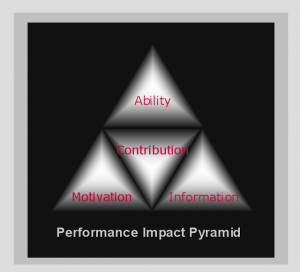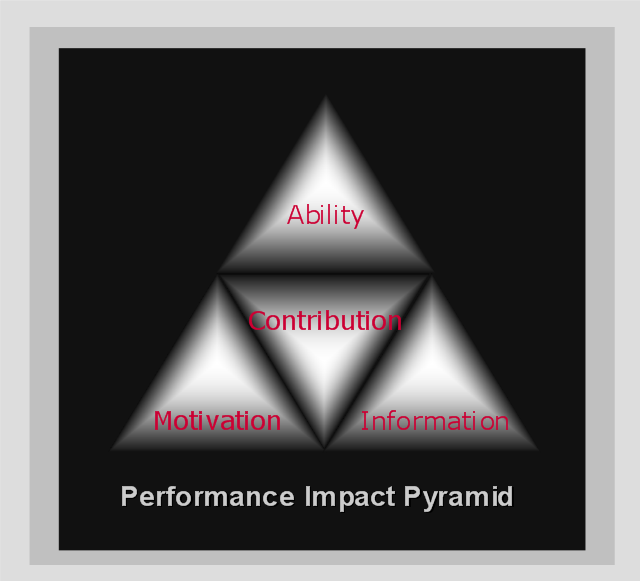Leaders don’t accomplish things on their own. They achieve results through other people. The on-going success of an organization depends on two key factors: achieving immediate goals and 2) long term sustainability. For a leader this translates into fostering individual contribution and personal growth among his or her people.
Leaders who focus solely on individual contribution (which many do) sacrifice long term growth and development. They are successful as long as there aren’t significant changes in the business environment.
Leaders who focus solely on growth and development of their people, which is much rarer, often miss their immediate performance targets. Their people aren’t seen as drivers or key “players” in the organization because their impact is hidden. Although highly skilled they get passed over for promotions and raises. Often they become great candidates for competitors.
The best leaders balance both the short term contribution and long term development of their people.
Individual contri bution
bution
Individuals (or teams) need three things in order to contribute to the organization: ability, information, and motivation. Without all three, performance is hampered.
Information and motivation are the most overlooked. When people aren’t performing, leaders often assume a lack of ability. In my experience, motivation and information impede performance more often. People can do the work, they just don’t want to. Or, they want to but don’t have all of the necessary information to do it. How hard is it for your people to access information about your business? Do your reward structures and culture align with the behaviors you are seeking? Look closely, you’ll be surprised.
The problem is that the person who is best positioned to contribute to a given task or role, is probably less likely to learn from it. That person is typically already an expert (or at least very well qualified). It is tempting to keep that person in their role to take advantage of their experience and efficiency. Yet, the more they do that role, the less they grow and develop. They might not be prepared to adapt when new requirements come along.
Growth and development 
Growth and development also require three things: experience, support, and feedback. Support is the most visible and tangible of the three. Organizations often have robust processes for development planning and tracking. Many provide structured curricula and training experience for their people. Despite its visibility, support is only a very small part of an individual’s development. Less than 5% of an individual’s paid time comes from training, formal development planning or coaching.
On the other hand, people’s experiences, where they spend 90-95% of their time are often left to chance. In some organizations, succession planning provides a bit more structure although primarily for a select group of people who have already shown high levels of development. For the rest of the workforce, job assignments, tasks, and positions are generally not planned. People move from position to position often to increase their salary or title with less concern for their ability or marketability. Providing more structure and intention around people’s experience will accelerate individual growth and development.
Finally, feedback which is a critical component of development is often relegated to a formal review process which occurs annually or semi-annually at best. Dr. K. Anders Ericcson from The Florida State University and an expert in the development of expertise, has noted that one of the key differentiators between experts and non-experts is the amount of feedback received. A leader can be instrumental in helping his or her people receive on-going feedback. This doesn’t only imply feedback from the leader. It also means feedback from peers, from other leaders in the organization, from customers, and from subordinates. The leader is often better positioned to solicit these other people’s time to provide feedback to his or her team members.
Focusing too much on growth can have its own downside. Just as the person with ability, information, and motivation learns the least from a role but contributes the most, the opposite is true for someone who is learning. The person who is new or unfamiliar with a role is less likely to contribute as much.
So, what is a leader to do?
The key to sustaining a workforce that can contribute and grow is balance. People’s needs differ through their career. For an individual who was recently promoted, focusing on growth and development is a good idea. For an individual who is a year away from promotion, ensuring they are making a visible contribution is important. All of this is also dependent on the business context as well. A department that is at risk or in the midst of major turmoil needs to focus on contribution, it’s not a time to let people grow and explore. Here are a few additional tips:
- Expand development planning to include proactive plans for experience (formal and informal), feedback (formal and informal), and support. Hold people accountable for all three, not just adherence to a training plan.
- Be creative. Experience doesn’t mean that a person has to be formally assigned to a new team. Have a junior person proofread a proposal or presentation from another department. They are contributing by providing the proofing while learning about another part of the business.
- Seek feedback for your people – not just from you. Find out what areas your people want to develop and identify the best sources of feedback for those areas. Set up on-going mechanisms through discussions with people, surveys, or other means to get feedback to them.
- Map your people against growth and contribution. If they are heavy on one but low on the other, make adjustments.



Chief: I have been wondering… what is the role of leadership development during an economic recession? In other words how would you describe the importance and benefits of the kind of work you do in an economic climate where 80,000 jobs were lost in one month? I’m assuming that many organizations may view such enhancement programs as extra or unessential during economic downturns, right? So, is there a bottom-line argument to be made that cultivating these skills is not only important but crucial during such times? I’m curious, but also think there could be a major pub in the topic for someone who wants to take it on.
Great question!!!
On a macro level, I think that part of the reason we’ve gotten into this current mess is due to a lack of leadership and leadership development. So, if there might be a silver lining to this economic crisis maybe it will be to point out the severe gap that we have in leaders.
On a more pragmatic level, I agree that development programs quickly fall to the “nice to have” list as companies try to stay afloat.
On a micro level good leadership development also should be a combination of epxeriences, support, and feedback…perhaps some of the budget for formal workshops will have to be trimmed. However experience and feedback are usually free…now is a good time to ramp those up. If we are losing so many jobs, the people remaining are going to have to stretch and do more..this means even do more leading or do more “doing” (which requires better leading). So, this is a great time to hone your leaders. It’s easy to be a leader in good times…the great leaders are the ones who can make it through the bad times.